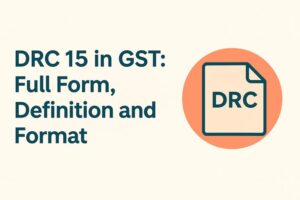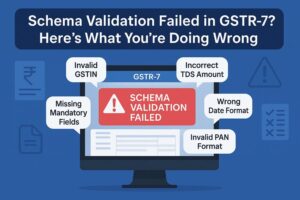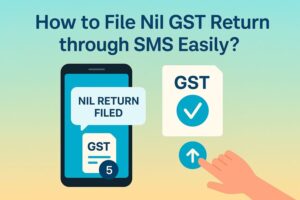Why is GST Important in the Online Gaming Industry?
- 16 Aug 24
- 13 mins

Why is GST Important in the Online Gaming Industry?
Key Takeaways
- GST Rates: Online skill games are taxed at 18%, while games of chance in online casinos face a 28% rate, reflecting the distinction between skill-based and chance-based activities.
- GST Reclaims: Players cannot reclaim GST, but operators can claim input tax credits on business-related expenses.
- GoM Oversight: The Group of Ministers reviews and advises on GST policies for online gaming, impacting regulatory and tax compliance.
- Advance Rulings Access: Information on advance rulings is available through official legal authorities and specialized tax platforms.
- Ongoing Updates: Staying informed on GST regulations through continuous monitoring and consultation with tax professionals is essential for compliance and strategic planning in the online gaming industry
The digital transformation has revolutionized not just how we play games but also how these activities are taxed under modern regulatory frameworks. With the rise of online gaming, casinos, and lotteries, understanding the Goods and Services Tax (GST) implications is crucial for both operators and players.
Current Taxability of Online Gaming
The taxability of online gaming in India primarily falls under the Goods and Services Tax (GST) regime, which was implemented to unify the country's tax structure. Online gaming, including both games of skill and games of chance, has been a significant area of focus due to its rapid growth and the substantial revenues it generates.

- GST on Online Games of Skill: Online games that are predominantly based on skill are not considered gambling and are generally taxed under the GST at a rate of 18%. These include games like rummy, chess, and fantasy sports where the outcome depends on the player's skill rather than chance.
- GST on Games of Chance: Games of chance, which include various forms of gambling and betting, are taxed at a higher rate. According to the GST Council, these activities can attract a tax rate of 28%, which is applicable to the entire bet amount.
- GST on Online Casinos and Lotteries: Online casinos and digital lotteries are also subjected to the 28% GST rate. The tax is applied not just on the service fee but also on the betting pool, which increases the tax burden on operators and players.
- Compliance and Regulatory Challenges: Online gaming companies must comply with multiple regulatory standards, including issuing detailed invoices and maintaining transaction records. They also need to navigate various state laws that can impact their operations, as some states have specific rules concerning online gambling.
- Recent Legal and Governmental Actions: The Government of India, through its various bodies like the GST Council and the Ministry of Finance, regularly reviews the taxation framework for online gaming. Recent discussions have focused on whether a uniform tax rate should be applied across all forms of online gaming or if different categories should be taxed differently based on their mode of operation and public policy impact.
GST Rates on Online Gaming and Casinos
The taxation landscape for online gaming and casinos has evolved significantly with the integration of Goods and Services Tax (GST) in India. This sector, encompassing everything from skill-based platforms to chance-based casinos and lotteries, faces a complex tax structure that is crucial for operators and participants to understand.
- GST on Skill-Based Gaming Platforms
Skill-based games, where the outcome largely depends on the player's ability and decision-making rather than luck, attract an 18 percent GST. This includes games like chess, rummy, and certain e-sports that qualify as games of skill. These platforms must adhere to GST compliances, ensuring proper invoicing and tax filings.
- GST Treatment for Games of Chance
Online casinos and other games of chance are taxed at a higher rate of 28%. This rate applies not just to the service fee but also to the betting amount, which significantly increases the tax burden. Such platforms require rigorous regulatory compliance, including frequent GST filings and adherence to anti-money laundering (AML) regulations.
- Taxation of Online Lotteries
Online lotteries are subject to a GST of 28%, imposed on the face value of the ticket, including the prize payout. This uniform rate simplifies the tax structure but increases the cost for consumers. Platforms offering these services need to maintain meticulous records to manage show-cause notices and tax demands effectively.
- Compliance and Legal Considerations
Online gaming firms must navigate a myriad of regulations, from platform fees to entry-level access controls. Compliance is key to avoiding huge tax demands and legal challenges, including those from the Supreme Court or high courts like the Karnataka High Court. The legal landscape around these platforms often involves interpretations from senior advocates like Harish Salve, who weigh in on complex tax and regulatory issues.
- Advance Rulings and GST Council Updates
The GST Council, along with inputs from finance ministers across states, regularly updates tax policies affecting the online gaming sector. These updates can include changes in tax rates, clarification on what constitutes a game of skill vs. a game of chance, and guidelines on how taxes should be applied to emerging digital assets.
- Impact on Startups and New Market Entrants
For online gaming startups and new market entrants, understanding the GST implications is crucial. The initial purchase of digital infrastructure, platform fee setups, and the marketing of games must all consider GST implications to ensure financial viability and compliance.
- Future Prospects and Innovations
Artificial intelligence advancements and other disruptive innovations are driving the continued growth of the online gaming industry. As the sector expands, so does the scope of taxation. Future regulations might adapt to include virtual currencies and more complex digital assets, which will necessitate ongoing vigilance and adaptation by gaming companies.
How to Calculate GST on Online Gaming and Casinos?
Calculating GST for online gaming and casinos involves understanding several key aspects of the tax regulations governing these digital entertainment platforms. Here's a step-by-step guide on how to calculate GST for these services, including an example that incorporates various keywords to ensure clarity and relevance.

Step-by-Step Guide to Calculating GST on Online Gaming and Casinos
Identify the Type of Game: Determine whether the game is considered a game of skill or a game of chance. This classification affects the GST rate applied.
Step 1: Determine the Applicable GST Rate
- Games of Skill: Generally, online skill games are taxed at 18% GST.
- Games of Chance and Online Casinos: These are usually taxed at a higher rate of 28%.
Step 2 : Calculate the Taxable Amount
This is typically the total revenue generated from the game without any deductions. For games of chance, this includes the total bet amount.
Step 3: Apply the GST Rate
Multiply the taxable amount by the GST rate to get the amount of GST owed.
Example of GST Calculation on Online Gaming
Scenario: An online gaming platform offers a poker game, categorized as a game of chance. In a day, the platform collects a total bet amount of ₹1,00,000 from its players.
GST Calculation
Total Bet Amount: ₹1,00,000
Applicable GST Rate: 28% for games of chance
GST Payable = ₹1,00,000 x 28% = ₹28,000
In this scenario, the platform needs to remit ₹28,000 as GST to the tax authorities.
Considerations for Online Gaming Platforms
- Platform Fees: Many online gaming platforms charge a service fee. This fee itself is also subject to GST at the applicable rate, typically 18%.
- Compliance and Filing: Platforms must ensure they are compliant with GST regulations, filing returns and remitting taxes periodically. They should maintain detailed records to manage and fulfill GST demands effectively.
- Marketing and Promotions: The impact of GST also extends to the marketing activities of online gaming platforms. Effective marketing strategies should consider the cost implications of GST on promotional services.
Impact on Players
Players are indirectly affected by GST as it influences the cost of playing and the winnings from online gaming. Understanding how GST is applied helps players in making informed decisions regarding their gaming activities.
GoM on GST on Online Gaming and Casinos
The Group of Ministers (GoM) on GST has been pivotal in addressing the complexities of tax regulations for online gaming and casinos. Their deliberations and decisions shape how GST is applied, ensuring that the rapidly evolving sector remains compliant while fostering growth. Here’s an overview that incorporates essential keywords to provide clarity on the topic:

The GoM on GST, comprised of finance ministers and senior officials from various states, focuses on examining and recommending appropriate tax structures for the online gaming and casino industry. Their considerations significantly impact gaming revenue, compliance requirements, and the overall regulatory environment.
Key Considerations by the GoM
- GST Rates: Determining whether different types of games, such as skill-based games and games of chance, should have uniform or differentiated GST rates. Current regulations impose an 18% GST on games of skill and a higher rate of 28% on games of chance and casinos.
- Compliance Challenges: Addressing the complex compliance needs of online gaming platforms, especially those that operate across state boundaries. This includes the management of platform fees, entry amounts, and the proper documentation and submission of taxes.
- Market Dynamics: Understanding the market dynamics and competitive landscape of the online gaming industry, including the entry of new platforms and the impact of foreign investment in Indian gaming companies.
- Tax Collection and Remittance: Ensuring efficient processes for the collection and remittance of GST by online gaming platforms. This includes mechanisms for automatic refunds, addressing demand notices for tax dues, and ensuring direct tax compliance.
- Influence of Digital Transformation: Considering the impact of digital assets and technologies, such as blockchain and artificial intelligence, on the gaming sector. These technologies could redefine the mechanisms for transparency and tracking of transactions.
- Consumer Protection and Fair Play: Ensuring that GST policies also consider consumer protection, promoting fair play and responsible gaming practices across platforms.
- Stakeholder Engagement: Engaging with industry players, including major firms like Mobile Premier League and other key market participants, to gather insights and feedback on proposed tax policies and their impact.
Recent Actions and Future Prospects
The GoM frequently updates its recommendations based on industry trends and economic impacts. These updates are crucial for maintaining a balanced approach that supports both tax revenue generation and the healthy growth of the gaming industry.
Impact on the Industry
The decisions made by the GoM directly influence operational strategies of online gaming and casino companies. Efficient marketing strategies, competitive branding, and customer experience enhancement are all shaped by the regulatory framework established by the GoM. Furthermore, these companies must continually adapt to the ever-changing marketing landscape and consumer behavior influenced by tax structures and compliance requirements.
Advance Rulings on GST for Online Gaming and Casinos
Advance Rulings are decisions provided by the Authority for Advance Rulings (AAR) concerning the application of GST. These rulings help companies understand how GST laws apply to their specific circumstances before they undertake certain transactions. For online gaming and casino operators, these rulings provide crucial insights into tax obligations and compliance requirements.

Key Areas Affected by Advance Rulings
- GST Rates Application: Advance rulings clarify the GST rates applicable to different types of online gaming activities, distinguishing between games of skill and games of chance. Typically, games of skill attract a lower GST rate (18%) compared to games of chance, which are taxed at the highest bracket (28%).
- Taxation of Platform Fees and Service Charges: Many online gaming platforms charge users a fee for accessing their services. Advance rulings help define the tax implications of these fees, ensuring that companies apply the correct GST rates and comply with tax laws.
- Impact on Marketing and Promotional Activities: Understanding the GST implications for various marketing activities, including the provision of free credits and bonuses, is crucial. Advance rulings can determine how these promotions should be treated under GST, influencing marketing strategies and budget allocations.
- Compliance and Documentation Requirements: For businesses in the online gaming industry, maintaining compliance with GST laws is critical. Advance rulings provide guidance on the documentation and records that need to be kept to satisfy tax authorities, reducing the risk of disputes and demand notices for tax dues.
- Handling of Winnings and Betting Pools: The way winnings and entry fees are taxed can significantly impact the prize pools and the attractiveness of gaming platforms. Advance rulings provide clarity on these aspects, helping platforms design their prize distribution mechanisms in compliance with GST laws.
Examples of Recent Advance Rulings
- Example 1: A recent ruling clarified that the entry fees collected for participating in online poker tournaments are subject to GST at the rate of 28%, as the activity is considered a game of chance.
- Example 2: Another ruling stated that a platform facilitating online chess tournaments should charge GST at 18%, as chess is predominantly a game of skill.
Future Implications of Advance Rulings
The precise application of GST through advance rulings encourages transparency and fairness in the rapidly growing online gaming sector. It also assists in shaping the future landscape of the industry by setting precedents that other companies might follow.
Conclusion
The GST on online gaming and casinos is complex and dynamic, heavily influenced by continuous legal reviews and regulatory updates. Key takeaways include the differential GST rates for skill-based games at 18% and games of chance at 28%, the non-reclaimable nature of GST for players, and the potential for operators to claim input tax credits.
Advance rulings provide essential guidance for compliance, while the GoM's oversight ensures the industry adapts to evolving economic and technological landscapes. For anyone involved or interested in the online gaming industry, staying informed about these regulations is crucial for navigating the intricacies of GST compliance and capitalizing on market opportunities effectively.
As online gaming continues to grow, both players and operators must stay informed about the latest tax regulations to ensure compliance and make informed decisions.
💡Facing delays in making business payments on time? Download Pice business payment application, which will help you manage all your business payments, GST, vendor payments, rent, etc. from one place.
 By
By 

















